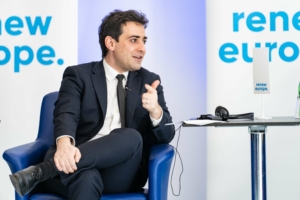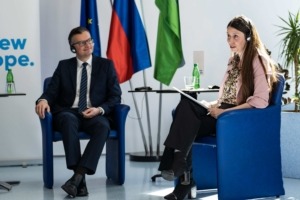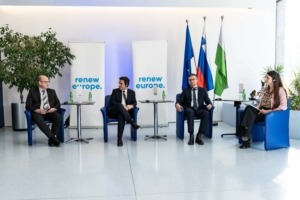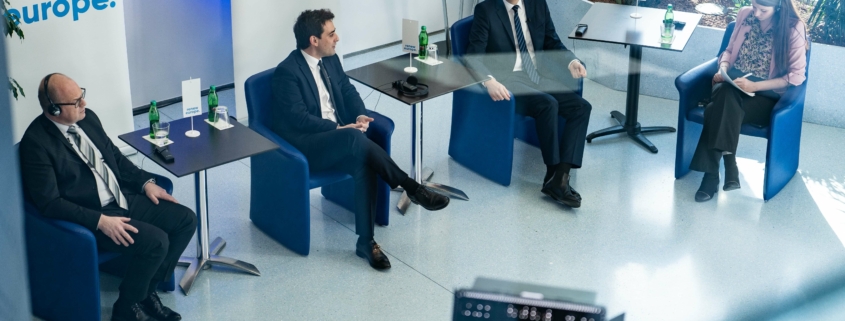Today, on 23 February 2022, MEP Irena Joveva hosted a virtual round table entitled A Vision for a RENEWed European Union as the closing event of a two-day working visit by Stéphane Séjourné, President of the Renew Europe political group in the European Parliament, an MEP and a close associate of French President Emmanuel Macron. Marjan Šarec, LMŠ party president, also participated in the discussion alongside the two hosts, both MEPs, Irena Joveva and Klemen Grošelj.
Initially, everyone present stressed the importance of the April elections in Slovenia, Hungary and also in France. “These are key moments for Europe because national elections are also European elections, which we and the electorate must be aware of. However, the French elections are slightly different as we are trying to re-elect the same president, while you want to find an alternative to the existing government. Nevertheless, I see similarities in particular in terms of the kind of society we want, open or closed,“ Stéphane Séjourné said, noting the importance of liberalism, the power of civil society and the significance of the free market. Marjan Šarec believes that the elections in any Member State affect the stability of the whole European Union, saying, “If one link in the chain is problematic in this regard, it affects everyone. At the moment, Slovenia is among the three problematic countries, which is why elections are so important.” He added that the election on 24 April will be actually a referendum on the kind of country we want to live in. He believes it is crucial for people to exercise their right to vote, because every single vote counts. Irena Joveva also considers European values to be key for the future, which Renew Europe also strongly advocates:
“Our political group is very heterogeneous. We frequently have different views, but we are really united when it comes to the main issues. These are our values. Our principles. The fact that we are unwavering in defending and strengthening European values, the rule of law, civil liberties, fundamental rights, that we are fighting injustice and discrimination, for the freedom of the media… In the European Parliament, we are practically always the ones who tip the scales one way or the other in the decision-making process.”
Stéphane Séjourné added that Renew Europe is addressing the priorities that are at the heart of the political debate about democracy and economic recovery. In the wake of the health crisis, a new development model will have to be drawn up to enable Europe to be competitive over the next 15 years. The US and China are also investing heavily in development. At the same time, Renew Europe is also working to maintain the rule of law, as well as bringing social and democratic issues to the fore. According to Šarec, Renew Europe is also facing a great responsibility, as the EU needs a liberal centre in the wider area, and at the same time he expressed his satisfaction about the work and international visibility of MEPs Joveva and Grošelj.
 Green policy and sustainable solutions are also among Renew Europe’s main priorities. Séjourné said they wanted to achieve radical decarbonisation and strike the right balance while at the same time adopting the right measures to help the economy. For Grošelj, the biggest challenge in terms of achieving carbon neutrality by 2050 is securing sufficient investments in research and development, which is also one of the anchors of the LMŠ programme. “The research and development findings need to be translated into new technologies that will spur new ideas, create new high-quality jobs, and provide high personal income that will be sustainable, as well as public education and public health. In doing this, the European Parliament will play an extremely important role; it will set a common legal framework, and this will be a driver of further development and progressive policies.”
Green policy and sustainable solutions are also among Renew Europe’s main priorities. Séjourné said they wanted to achieve radical decarbonisation and strike the right balance while at the same time adopting the right measures to help the economy. For Grošelj, the biggest challenge in terms of achieving carbon neutrality by 2050 is securing sufficient investments in research and development, which is also one of the anchors of the LMŠ programme. “The research and development findings need to be translated into new technologies that will spur new ideas, create new high-quality jobs, and provide high personal income that will be sustainable, as well as public education and public health. In doing this, the European Parliament will play an extremely important role; it will set a common legal framework, and this will be a driver of further development and progressive policies.”
Speakers also touched on the rule of law. Grošelj believes that it is the cornerstone of the European Union, but some leaders are tearing it down, so regulators must invent ever-new regulations. Séjourné highlighted the functioning of the independent media and the judiciary:
“If the media is not free and judges – who decide on election-related appeals – are not free, then the election cannot not be fair.”
In his view, the rule of law mechanism must act primarily as a deterrent – to deter some other European leaders from acting foolishly. Grošelj pointed to the need for independence of state and regulatory institutions that scrutinise the work of the executive, “If there is no rule of law, then the state cannot function, but it is the choice of each individual politician as to what they will do.”
 Joveva also mentioned the division that exists in the political and civil spheres in Slovenia, “They say no one should be excluded, while they are doing exactly that with those who criticise them. They talk about communists being to blame for everything in this world, let alone in our country, while using those very same methods themselves.” Šarec believes that Slovenia is not divided into two equal parts, “Seventy-five per cent of people think along centrist lines and entirely in line with EU values. They don’t care about politics enough to fight about it. That can only happen if someone provokes it.” At the same time, everyone thinks it is important, above all, to have a forward-looking view.
Joveva also mentioned the division that exists in the political and civil spheres in Slovenia, “They say no one should be excluded, while they are doing exactly that with those who criticise them. They talk about communists being to blame for everything in this world, let alone in our country, while using those very same methods themselves.” Šarec believes that Slovenia is not divided into two equal parts, “Seventy-five per cent of people think along centrist lines and entirely in line with EU values. They don’t care about politics enough to fight about it. That can only happen if someone provokes it.” At the same time, everyone thinks it is important, above all, to have a forward-looking view.
Stéphane Séjourné also commented on current developments in Ukraine by saying, “Diplomacy has done everything to avoid the events that could happen in Ukraine in the coming days. The talks must go on, but serious sanctions must also be adopted which are being discussed at the EU level at the moment.” He said that despite the government control of the media, public opinion in Russia is not sympathetic to what is going on in Ukraine:
“President Putin is a man of the 20th century, he is nostalgic and misses Russia’s greatness. He uses the tricks of old dictatorships, which have already failed, for instance, the manipulation of public opinion and of elections.”
Séjourné believes that the Ukrainian crisis is about the borders of the European Union and that we are also defending the Ukrainian people and their right to sovereignty and self-determination. Concerns are also justified for the Baltic states bordering Russia.
 At the end of the round-table discussion, Stéphane Séjourné added, “At the moment, there are two different visions of society. We wish to avoid slipping into illiberalism or the decline of certain countries. I don’t want to dramatize it, but it’s really a referendum. These elections have a European momentum. We need to mobilise and motivate young people, who are difficult to engage today, because democracy is taken for granted. We were born into it, and we don’t know what it’s like to live without democracy. We must say that what we have achieved is the result of national struggles, revolutions, and the struggle for the independence of countries. We can lose all of this very quickly – we can see the instability in Russia and Ukraine and how societies can change completely. It’s always easier to demolish than to build.”
At the end of the round-table discussion, Stéphane Séjourné added, “At the moment, there are two different visions of society. We wish to avoid slipping into illiberalism or the decline of certain countries. I don’t want to dramatize it, but it’s really a referendum. These elections have a European momentum. We need to mobilise and motivate young people, who are difficult to engage today, because democracy is taken for granted. We were born into it, and we don’t know what it’s like to live without democracy. We must say that what we have achieved is the result of national struggles, revolutions, and the struggle for the independence of countries. We can lose all of this very quickly – we can see the instability in Russia and Ukraine and how societies can change completely. It’s always easier to demolish than to build.”




Leave a Reply
Want to join the discussion?Feel free to contribute!